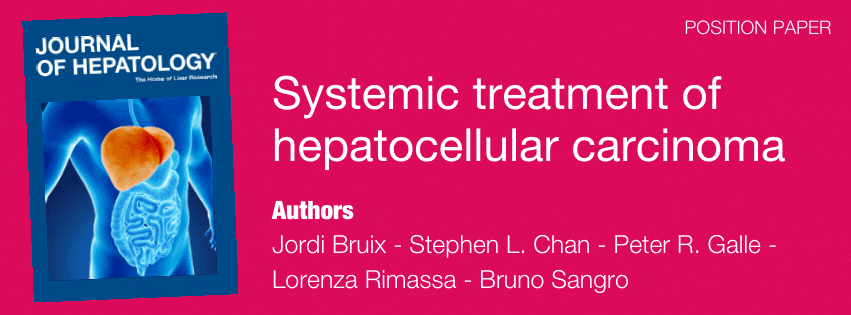New EASL Position Paper provides guidance on systemic treatment of liver cancer

26 August 2021
On 10 July 2021, the Journal of Hepatology published a new free-access EASL Position Paper, titled, “Systemic treatment of hepatocellular carcinoma”, by Jordi Bruix et al.
This Position Paper provides recommendations that complement previous EASL Clinical Practice Guidelines published in 2018. It serves to support clinicians, helping them provide the best possible care for patients. Because the last five years have witnessed relevant advances in the systemic therapy of hepatocellular carcinoma, new data has emerged on its management. Accordingly, EASL commissioned this Position Paper, which re-evaluates the efficacy and safety of available treatments and the main findings, summarised in tables, help clinicians make optimal therapeutic decisions.
Recent major advance has been performed in the field of the systemic treatments of HCC with several new drugs including tyrosine kinase inhibitor, anti-angiogenic treatment and immunotherapy leading to an improvement in term of survival for patients with advanced primary liver cancer. This Position Paper provided by EASL summarises the most up to date knowledge in the complex field of systemic treatment of HCC in term of treatment selection, management of adverse events, and how to sequence the different available systemic therapies,
said Prof. Thomas Berg, EASL Secretary General
The context: EASL and the fight against liver cancer
Liver cancer has become an increasingly serious public health threat, with a recent WHO Report demonstrating it has become the world’s third-most deadly malignancy worldwide and claimed nearly one million lives in 2020 alone. EASL has made it its mission to tackle this threat head on and champion the research, studies, education, and awareness behind life-saving treatments and cures critical to reducing this burden. By facilitating publications, seminal meetings and communication among specialists across Europe, EASL aims to ensure all those involved with treating liver disease can realise their full potential in curing and preventing it.
A snapshot of this Position Paper
Drugs licensed [for the treatment of hepatocellular carcinoma] in some countries now include four oral multi-tyrosine kinase inhibitors (sorafenib, lenvatinib, regorafenib and cabozantinib), one antiangiogenic antibody (ramucirumab) and four immune checkpoint inhibitors, alone or in combination (atezolizumab in combination with bevacizumab, ipilimumab in combination with nivolumab, and pembrolizumab in monotherapy). Prolonged survival in excess of two years can be expected in most patients with sensitive tumours and a well-preserved liver function that render them fit for sequential therapies.
Tables include:
- Summary of efficacy and toxicity of systemic therapies approved by regulatory agencies for HCC
- Summary of background of study populations in stratified randomized clinical trials on systemic agents in HCC
- Requirements specific to first-line agents considered as inclusion or exclusion criteria in pivotal clinical trials
- Regulatory situation of the different agents approved for HCC worldwide (as of February 2021)

